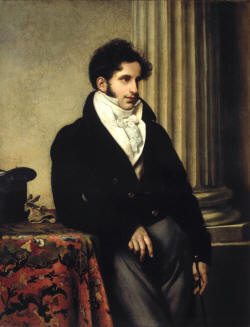

Queer Places:
Porech'ye, Moscow Oblast, Russia, 143263
 Count
Sergey Semionovich Uvarov (25 August (5 September) 1786, Moscow – 4 (16)
September 1855) was a Russian classical scholar best remembered as an
influential imperial statesman under Nicholas I of Russia. Uvarov's known
relationship was with Prince
Mikhail
Alexandrovich Dondukov-Korsakov, who, according to
Pushkin's scurrilous epigram,
was owed his appointment in the Academy of Sciences to his homosexual
relationship with Uvarov.
[5]
Count
Sergey Semionovich Uvarov (25 August (5 September) 1786, Moscow – 4 (16)
September 1855) was a Russian classical scholar best remembered as an
influential imperial statesman under Nicholas I of Russia. Uvarov's known
relationship was with Prince
Mikhail
Alexandrovich Dondukov-Korsakov, who, according to
Pushkin's scurrilous epigram,
was owed his appointment in the Academy of Sciences to his homosexual
relationship with Uvarov.
[5]
Of Tatar roots,[1] Uvarov, connected through marriage with the powerful Razumovsky family, published a number of works on Ancient Greek literature and archaeology, which brought him European renown. A confirmed conservative, he was on friendly terms with Alexander Humboldt, Madame de Stael, Goethe, Prince de Ligne, Nikolay Karamzin, and Vasily Zhukovsky. Uvarov studied in Göttingen, and from 1811 to 1822, he curated the Saint Petersburg educational district.
In 1832, Uvarov was appointed Deputy Minister of National Education, succeeding his father-in-law Count Aleksey Kirillovich Razumovsky. He was elected an Honorable Member of the Russian Academy of Sciences in 1811 and was the president of that venerable institution from 1818 until his death. In the wake of the Decembrist revolt of 1825, the tsar moved to protect the status quo by centralizing the educational system. He wanted to neutralize the threat of foreign ideas and what he ridiculed as "pseudo-knowledge." However, Uvarov quietly promoted academic freedom and autonomy, raised academic standards, improved facilities, and opened higher education to the middle classes. By 1848 the tsar, fearing the political upheavals in the West might cause uprisings in Europe, ended Uvarov's innovations.[2]
Uvarov was responsible for coming up with the formula "Orthodoxy, Autocracy, and Nationality", the basis of his activities regarding public education. According to Uvarov’s theory, the Russian folk (narod) is very religious and devoted to the Emperor, so the Orthodox religion and Autocracy are unconditional bases of the existence of Russia. Nationality (Narodnost) is deemed to be the necessity to follow independent national traditions and to fight foreign influence. The theory stated that it was necessary to reject western ideas – freedom of thinking, freedom of personality, individualism, rationalism which were considered by Orthodox religion as dangerous and rebel thinking. The chief of Russian political police (the III Department of His Majesty Personal Chancellery) Alexander von Benckendorff wrote that “the past of Russia was wonderful, the present is splendid and the future is above all dreams””. These three concepts were considered as "pillar-walls" of the Russian Empire. He worked to limit access to education by people of non-noble origin and strengthening governmental control over the universities and gymnasiums, once famously remarking, "No university Pugachevs." It means that only a small part of Russian population (only noble ones, many of them of foreign descent) had the possibility to get the education; it was almost impossible for Russian non-nobles to get access to education. Within this meaning, the Narodnost (Nationality) meant that Russian folk had to stay away from education (Western influence) in order to preserve the folks' pure Russian national character.
The universities were small and closely monitored, especially the potentially dangerous philosophy departments. Their main mission was to train a loyal, athletic, masculinized senior bureaucracy that avoided the effeminacy of office work.[3][4]
Despite these reactionary measures, Uvarov was also responsible for laying the foundations of high-quality education in Russia and reinstating the practice of sending Russian scientists abroad. Unfortunately all his deeds and acts were a dead contribution into Russian educational system, because almost 99% of Russian population (non-nobles, folk) were prohibited from getting education, no matter how talented they were.
Uvarovite, the rarest of garnets, is named after him. His son Aleksey Uvarov co-founded the Russian Archaeological Society and the State Historical Museum in Moscow.
In recent years, the former minister lived, resting from the noisy St. Petersburg, in his beloved village Porechye of the Mozhaisk district, located not far from Moscow. His estate was a botanical garden (from overseas travel, the count brought strange plants, adapting them to the Russian climate), a huge park, a historical and archaeological museum, an art gallery, a library of a hundred thousand volumes, a study decorated with busts by Michelangelo, Machiavelli, Raphael, Dante works by Italian sculptors. Famous writers, professors and academics who had debates and conversations on various topics constantly condescended to visit him. Uvarov continued to perform the duties of the president of the Academy of Sciences, but these studies were not troublesome - life at the Academy was in line with the reforms carried out in the first years of his administration. Mailing of scientific papers and letters to academies and universities in Europe continued, becoming practice, both in Russia and in foreign educational institutions. In addition to reading books and communicating with pleasant interlocutors, Sergei Semenovich gave an assessment of the political situation.
Sergey Semenovich was buried in the ancestral village of Kholm, located near Porechye. His only son Alexei Uvarov later became a major collector of antiquities, an archaeologist and a historian, one of the founders of the Moscow Historical Museum - a unique collection of historical relics. In addition, he is honored to hold in Russia the first archaeological congresses that have a beneficial effect on the development of science.
My published books: